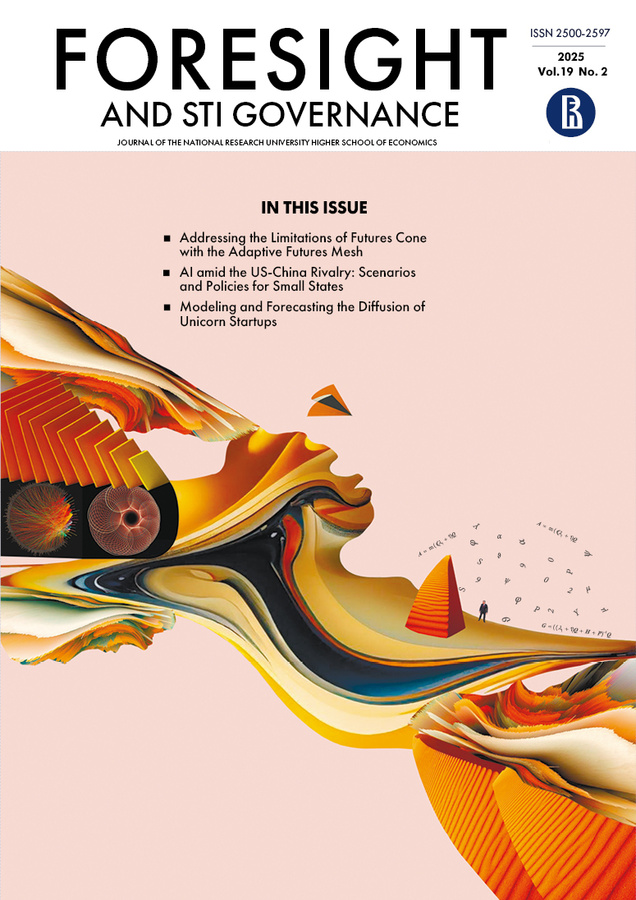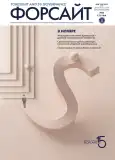Vol 16, No 4 (2022)
INNOVATION
Collegial forms of implementation of directionality in national innovation strategies
Abstract
The normative turn that occurred as a result of radical reforms in science, technology, and innovation policies in various countries has sparked a broad discussion around the “directionality-neutrality” dilemma in science, technology, and innovation (STI) development strategies. However, despite a number of recent publications and science and innovation policy programs, the relationship between these two principles, including the practice of their application by government agencies, remains understudied. A representative analysis (using qualitative methods) of the two national STI councils and their role in strategy development, focusing on the process of approach selection and its value orientation, will fill this gap. On the basis of the collected information and scientific literature, the connection with different policy options is identified. It is shown that the role of the councils is determined by their powers and resources and the boundaries of relevant practices and directions for further research are outlined.
 46-58
46-58


The dynamics of university-industry interactions in peripheral contexts: evidence from Brazil
Abstract
This research aims at addressing the factors that constrain the flow of knowledge between universities and industry when these players are embedded in peripheral contexts. A multiple-case study was carried out in order to describe and understand the limitations of universities as agents of innovation in peripheral ecosystems. Twenty-two semi-structured interviews were conducted with the coordinators of five Technological Innovation Centers (entities equivalent to TTO) of all Federal Institutes (five) located in the State of Minas Gerais, Brazil. The findings show that there are constraining elements associated with the socioeconomic environment (the lack of economic dynamism and low absorptive capacity at firms), with universities (a lack of infrastructure, resources, and available researchers) and intermediary agents (the lack of staff and institutional legitimacy). The observed conditions lead to challenges in fostering dense knowledge flows, thus perpetuating regional economic asymmetries and hindering the institutional evolution of academic institutions toward the notion of entrepreneurial universities. Our research contributes to literature by addressing in detail the limitations of universities in spurring dense innovation networks in laggard ecosystems. Instead, more complex co-evolutionary processes seem to be at play – and “silver bullet” policies are likely to offer disappointing results.
 59-69
59-69


MASTER CLASS
Maturity assessment of critical technologies
Abstract
A maturity assessment of technological projects is becoming an increasingly popular tool for innovation policy. It enables the accurate determining of risks and opportunities related to the creation of high-tech products. Determining the degree of technology readiness, especially at early stages of development, increases the performance of not only government programs, but also of business projects. This article presents a software interface for such expertise, the IAE/ITA TRL Calculator, designed for the Brazilian aerospace sector. The validation within a number of cases revealed its potential applicability in a wide variety of industries. This innovative software product includes a quality user guide and an improved visual interface that allows for easy and quick identification of issues that require additional effort in order to move the evaluated technology project to a higher level of readiness.
 71-81
71-81


New approaches to the improvement of coordination mechanisms
Abstract
The intensity and scale of communication between people, which have grown significantly over the past three decades, have not yet led to comparable improvements in the coordination of the activities of socioeconomic agents. One of the reasons is the lack of a full-fledged digital transformation of coordination mechanisms. Therefore, an urgent scientific task is to determine methodological approaches for the full digitalization of coordination processes. Cognitive sciences offer a fundamental description of the processes of socioeconomic coordination in the form of a shared mental model of participants in joint activities. Based on this, the concept of coordinating the activity of agents, which is the basis of all coordination processes, is defined. This approach made it possible to identify and analyze the main elements of the fundamental process of coordinating activities, as well as to determine the opportunities for its digitalization. This paper discusses the opportunity to create a unified coordination mechanism based on computer technologies, which, on the one hand, could replace the traditional market and hierarchical mechanisms, and on the other hand, could be used to coordinate all types of joint activities, including non-economic ones.
 82-89
82-89


STRATEGIES
Relocation as a driver of innovative activity: a global study of unicorn founders’ migration
Abstract
This paper investigates the migration flows of unicorns – private companies that achieve a market value of at least one billion USD within ten years. This concept was recently introduced by professional investors but has actively entered the global expert and political agenda. The ability of national innovation systems to grow unicorns has become a new hallmark of success.
This study uses the most complete sample of companies as of July 2022 (1,357 unicorns), for each of them we identified the founders, their countries of birth, and the educational institutions they graduated from.
Among the main results, it is revealed that 40% of billion-dollar companies were created with the participation of foreign founders. The authors identified three country groups depending on the founders’ migration flows direction: “attracting” unicorns, “growing on their own” and “losing everything”. A comparative analysis of countries’ innovation profiles made it possible to identify the unicorn growth and attraction factors. It is emphasized that universities are a significant resource for both strategies, since most of the founders graduated from the leading world universities and every third foreign entrepreneur was educated in the country of migration. It is shown that the strategy of attracting foreign founders complements the growth strategy and could provide the main flow of unicorn founders. The authors noted that the leading unicorn countries are actively involved in the global migration flow: they not only attract the founders, but also act as their largest suppliers. The authors put forward recommendations for attracting unicorn companies.
 6-23
6-23


Organizational meta capabilities in the digital transformation era
Abstract
When migrating to Industry 4.0, organizations face the need to adapt to a new context characterized by high levels of uncertainty and complexity. The main driving force in this process are the meta-competencies that ensure high competitiveness and innovativeness. However, their content, classification levels, intersections, and development potential under the influence of digitalization are insufficiently covered by the literature. This article attempts to fill this gap by analyzing the impact of new technologies on meta-competences. It presents a conceptual model based on the assumption that the degree of digitalization enhances the effects of the interaction between the top-level meta-competencies - Foresight, strategic flexibility, and ambidextrousness. Additional factors, the inclusion of which in the model will allow for a better study of the nature of the relationship under consideration, are proposed.
 24-31
24-31


The climate stigmatization of the global oil and gas industry: response strategies
Abstract
One of the most recent trends in the global economy is the stigmatization of the global oil and gas industry, i.e., the sharply negative public perception of the industry as a whole, and of its key players in particular. These processes, directly related to the aggravation of the climate-related issues, have already become a source of substantial problems for major industry players. In recent years, public opinion regarding major international oil and gas corporations has changed markedly, at least in most Western countries. Global industry leaders (the so-called supermajors) are increasingly perceived as an existential threat to humanity, laying on them the main responsibility for global warming. Faced with the challenges of the industry-level public ostracism (industry stigma), these companies have been the first to develop a set of responses. This paper attempts to take a fresh look at the supermajors’ climate strategies for responding to the industry stigma. Looking through the prism of the stigma management concept helps one identify the reasons behind the changes in global oil and gas corporations’ relevant strategies in the course of their evolution, and understand the logic behind the different approaches to the green transformation employed by European and US supermajors.
 32-44
32-44











